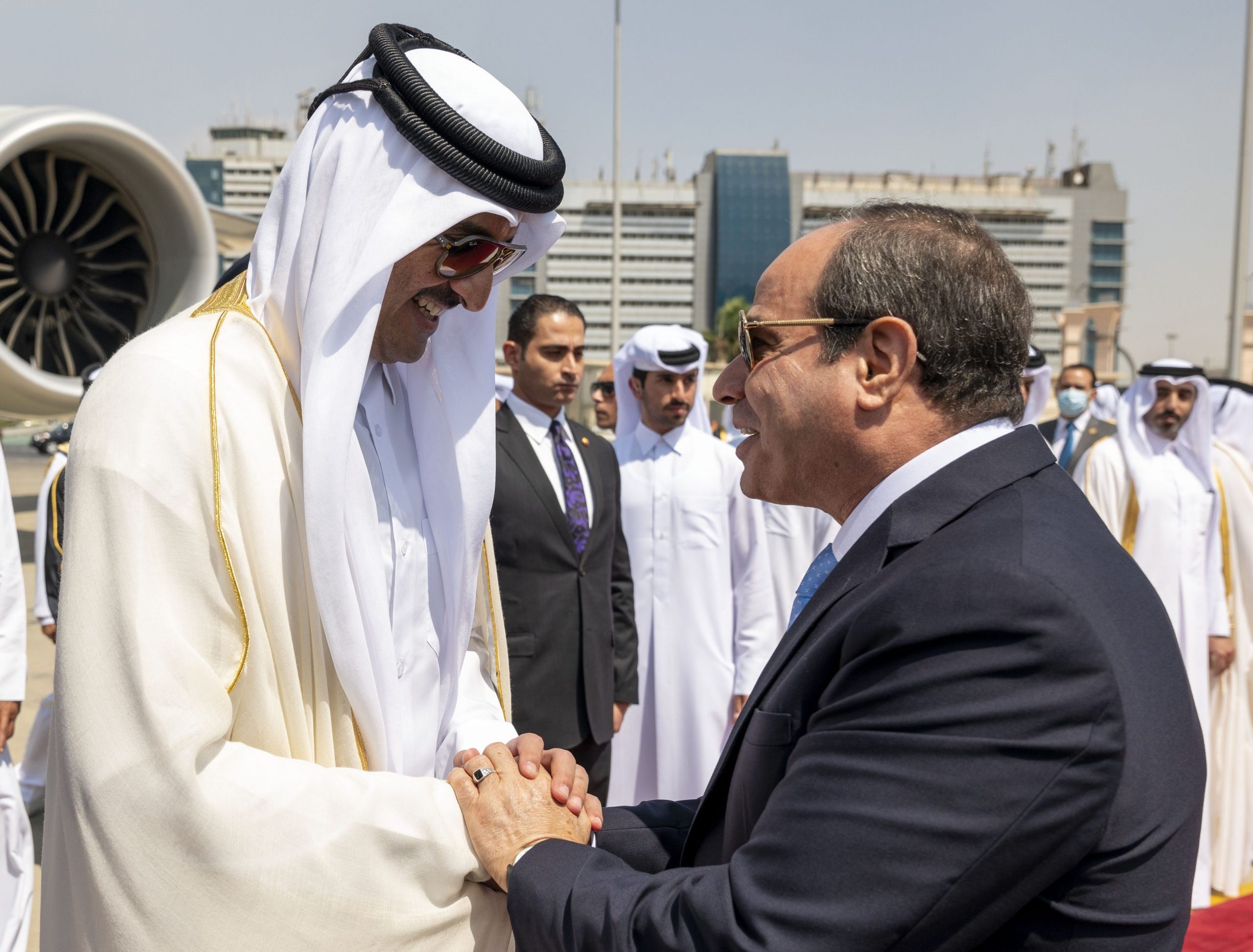While relations have appeared to warm, the Egyptian regime continues to crackdown on the press, including Al Jazeera journalists.
Egyptian President Abdelfattah El Sisi is set to visit Qatar on Tuesday in his first visit to the Gulf state since the 2017 GCC crisis, a source confirmed to Doha News on Monday.
Sisi is scheduled to stay in Doha for two days during a trip that will see him meet Amir Sheikh Tamim bin Hamad Al Thani.
The amir made a similar visit to Cairo on 24 June, marking the second such trip to Egypt since the 2013 military coup that saw Sisi seize power from then-leader Mohamed Morsi – the country’s first ever democratically elected president.
Meetings between the leaders come amid a warming of diplomatic ties between Doha and Cairo following the full restoration of ties in 2021 with the Al Ula Accord.
In 2017, Egypt had joined Saudi Arabia, the UAE and Bahrain to impose an illegal air, land and sea embargo on Qatar over claims that it supported terrorism. Doha vehemently rejected those claims as baseless.
Following the resumption of diplomatic ties last year, Qatar and Egypt have been witnessing what appears to be a new chapter in expanding relations, with mutual visits and agreements seen as key indicators.
Last month, Qatar and Egypt helped broker a ceasefire in the besieged Gaza Strip following a three-day deadly offensive by Israel. During the bombardment, the Zionist state killed 49 Palestinians including 17 children.
With Egypt scrambling to save its economy in light of the ongoing war in Ukraine, Cairo managed to secure investment deals worth $5 billion during the visit of Qatar’s Foreign Minister Sheikh Mohammed bin Abdulrahman Al-Thani to Cairo in March.
According to the World Bank, inflation in Egypt spiked to 8.8% in February, more than 2.7 percentage points higher than the average since the start of the 2021-2022 fiscal year. The increase has been attributed to the Russian invasion of Ukraine, which started on 24 February.
Political prisoners
However, while diplomatic relations between the two have appeared to warm, the Sisi regime continues to crackdown on the press, including Al Jazeera’s journalists.
In May, an Egyptian court sentenced Doha-based Al Jazeera presenter Ahmed Taha to 15 years in prison in absentia. Taha was sentenced over claims of “spreading false news” during an interview with Abdul Moneim Aboul Fotouh, a leading opposition figure and former presidential candidate in 2018.
Last month, Egypt authorities renewed the detention of Al Jazeera journalist Rabie El-Sheikh for 45 days on Monday, a decision slammed by the Qatar-based network as an attack on press freedom.
In a a statement, Al Jazeera condemned Cairo for its continuous imprisonment of El-Sheikh without charge despite his health continuing to deteriorate. The periodic renewal of prisoners in Egypt is a tactic often used by the regime every 15-to-45 days.
Meanwhile, there are three other Al Jazeera journalists behind bars in Cairo, including Hisham Abdel Aziz, Bahauddin Ibrahim, and Ahmed al-Najdi. Like El-Sheikh, all of them are being held without a charge, based on similar accusations linked to allegedly “spreading false information”.
“The network calls on all international press freedom and human rights organisations to condemn their arbitrary arrest and demand their immediate release,” said Al Jazeera last month.
In June, Reporters Without Borders said the four journalists’ “the real crime” was working for Al Jazeera Media Network, which has continued to face a crackdown by Egyptian authorities.
According to Reporters Without Borders (RSF), Egypt is one of the world’s biggest jailers of journalists, with many spending years in jail and solitary confinement without being formally charged or tried.
RSF says that more than 500 websites have been blocked since the summer of 2017, including news outlets. According to data from RSF, Egypt ranked 166th out of 180 countries in the 2021 World Press Freedom Index.
It is unclear whether the issue of imprisoned Al Jazeera journalists has been raised in ongoing senior meetings.







